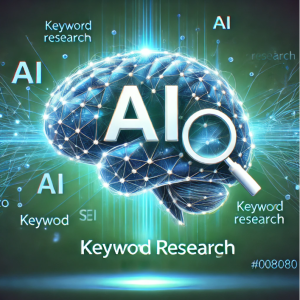AI in Improving Search Engine Rankings in 2025
Artificial Intelligence (AI) is a field of computer science focused on creating systems that can perform tasks that typically require human intelligence. These tasks include learning, reasoning, problem-solving, perception, and language understanding. In recent years, AI has become a pivotal part of many technologies we use daily, from the recommendation algorithms on streaming services to the virtual assistants in our smartphones. Let’s explore AI in improving Search Engine Rankings.
In the realm of Search Engine Optimization (SEO), AI is increasingly influential. Modern SEO strategies leverage AI to analyze vast amounts of data about search engine algorithms, user behavior, and website performance. This allows marketers and website owners to refine their strategies in real-time, enhancing their content visibility and improving search engine rankings.
The aim of this post is to delve into how AI tools and methodologies can significantly enhance SEO efforts. By understanding and harnessing AI, businesses can gain a competitive edge in how they optimize for both user experience and search engine criteria, ultimately driving more organic traffic to their sites.
Understanding Search Algorithms
Search engines like Google, Bing, and Yahoo use complex algorithms to determine the relevance and ranking of websites in search results. These algorithms consider hundreds of factors, known as ranking signals, which include keywords, site usability, page speed, backlinks, and content quality, among others. The primary goal is to provide the most relevant, useful, and credible information to users based on their search queries.
AI has revolutionized how these algorithms operate by introducing machine learning and deep learning into the process. These AI technologies enable search engines to learn from vast amounts of data and continuously improve their accuracy. For example, AI helps in understanding the context of content, not just the presence of specific keywords, allowing for more nuanced and precise ranking decisions.
Moreover, AI contributes to the refinement of search algorithms by:
- Enhancing language processing capabilities: AI models are adept at parsing user queries and understanding natural language, which helps in matching these queries with more relevant content.
- Personalizing search results: AI analyzes individual user behavior and preferences to tailor search results that are more aligned with their specific interests.
- Detecting and penalizing spam: Advanced AI algorithms can more effectively identify black-hat SEO tactics and spam, ensuring that such practices do not harm the user experience or disrupt the integrity of search results.
By integrating AI, search engines can not only sort through and rank billions of web pages more efficiently but also continuously adapt to new SEO trends and user behaviors, making the search experience significantly more robust and user-focused.
Keyword Optimization with AI
Keyword optimization is a cornerstone of effective SEO, and AI has become an invaluable tool in this area. AI-powered tools help identify the most relevant keywords for content by analyzing search data, competitor websites, and market trends. These tools not only suggest keywords but also provide insights on their search volume, competition level, and potential effectiveness in reaching target audiences.
AI Tools for Keyword Discovery and Optimization
- Semantic Analysis Tools: AI algorithms excel at understanding the context and variations of phrases. Tools like Clearscope and MarketMuse use AI to analyze top-performing content and suggest keyword variations that enhance relevance and authority.
- Predictive Search Analytics: Platforms like Google Ads Keyword Planner and Ahrefs harness AI to forecast keyword trends, allowing marketers to anticipate shifts in user interest and optimize their content proactively.
- Real-time Keyword Optimization: Tools like SEMrush use AI to offer real-time suggestions for keyword adjustments based on current search trends and competitive landscape analyses.
AI’s Role in Predicting and Shaping Keyword Trends
AI goes beyond simple keyword suggestions by predicting future trends based on vast amounts of historical data and current market signals. This predictive capability allows marketers to stay ahead of the curve, optimizing their content for keywords before they become highly competitive. AI systems analyze patterns in user behavior, search frequency, seasonal trends, and even global events to forecast changes in keyword popularity.
Moreover, AI can dynamically suggest optimizations for content as it’s being created. For example, an AI-driven content creation tool might recommend incorporating specific keywords that are rising in popularity or advise on the optimal keyword density to maximize SEO potential without risking keyword stuffing penalties.
Content Creation and AI
The integration of AI in content creation has significantly transformed how content is generated, optimized, and personalized, ensuring it meets the highest SEO standards. AI tools assist in crafting content that is not only relevant and engaging but also finely tuned to satisfy search engine algorithms.
AI-Driven Content Generation
AI content generators utilize natural language processing (NLP) and machine learning to produce coherent, contextually relevant content. These tools analyze existing online content to understand what performs well in terms of SEO and user engagement. They can generate drafts or complete articles that require minimal human editing. This capability is particularly useful for creating large volumes of content quickly, such as product descriptions, blog posts, and even news articles.
Examples of AI Tools for Optimized Content Creation
- OpenAI’s GPT-3: This advanced language generation model can write coherent and contextually relevant articles, summaries, and more, making it a powerful tool for content creators focusing on SEO.
- Grammarly: While primarily a writing assistant, Grammarly uses AI to enhance content readability and SEO by ensuring grammatical correctness and optimal use of keywords.
- Frase.io: This tool helps in creating content briefs based on the top results for a given keyword. It also suggests questions that should be answered in an article, based on what potential readers are asking online.
- Surfer SEO: It analyzes the content of top-ranking pages and provides detailed feedback on how to structure articles, how many times to use specific keywords, and other SEO tactics to enhance content’s search engine visibility.
Enhancing Content Quality and Personalization
AI not only helps in generating new content but also improves the quality of existing content. AI tools can suggest enhancements in real-time, like adjusting keyword density, improving sentence structure, and ensuring that content maintains a natural flow, which is essential for engaging readers. Additionally, AI can personalize content to match the specific preferences of different audience segments, thereby increasing its effectiveness.
AI-Powered Analytics Tools
AI-powered analytics tools are indispensable for understanding and optimizing SEO performance. These tools leverage AI to delve deep into data, offering granular insights that traditional analytics tools might miss. By doing so, they help businesses to not only gauge their current SEO performance but also identify and address potential weaknesses.
Leading AI Analytics Tools for SEO
- Google Analytics: While not exclusively an AI tool, Google Analytics has incorporated AI features to help predict user behavior and analyze traffic patterns. Its AI functionalities can alert users to significant anomalies in traffic, which could indicate SEO issues or opportunities.
- SEMrush: Known for its comprehensive SEO toolkit, SEMrush uses AI to enhance its site audit features, competitor analysis, and keyword research capabilities. It provides actionable insights that can help improve SEO strategies.
- Moz Pro: This tool uses AI to help track rankings, optimize keywords, and analyze backlinks. Its Page Optimization feature suggests concrete actions to improve SEO based on the content of competitors’ sites.
How AI Analytics Tools Identify and Rectify SEO Weaknesses
AI analytics tools scrutinize various aspects of SEO from backlinks and keyword performance to content quality and site architecture. Here’s how they contribute:
- Real-Time Problem Identification: AI tools continuously monitor SEO performance and can instantly detect issues such as drops in keyword rankings, broken links, or slow page loading times. Early detection allows for prompt corrective actions, preventing long-term negative impacts on search rankings.
- Predictive Insights: These tools can forecast future trends and potential issues based on historical data and current performance. For instance, they can predict which keywords are likely to become more competitive and suggest strategies to maintain or improve rankings.
- Automated Optimization Suggestions: AI-driven insights include recommendations for optimizing content, enhancing user experience, and improving technical SEO. These suggestions are often prioritized based on their potential impact, allowing SEO specialists to focus on the most significant improvements first.
By integrating AI-powered analytics into their SEO strategy, businesses can not only enhance their understanding of current performance but also proactively manage and improve their search rankings. This section of the blog post underlines the transformative potential of AI in analytics, providing concrete examples of tools and their benefits.
Enhancing User Experience with AI
Artificial Intelligence (AI) plays a crucial role in enhancing the user experience (UX) on websites, which is a significant factor in SEO success. AI can analyze user behavior, automate interactions, and personalize content, thereby improving both website navigation and user engagement.
AI’s Role in Improving Website Navigation
AI technologies can streamline website navigation by:
- Predictive Navigation: Using data from past user interactions, AI can predict what information or service a user might be looking for and facilitate navigation to those areas. For example, AI can dynamically alter the website’s navigation bar to highlight the most relevant sections for repeat visitors.
- Chatbots and Virtual Assistants: These AI-powered tools can guide users through a website, provide instant answers to their queries, and connect them with the appropriate content or service, improving user engagement and satisfaction.
Enhancing User Engagement with AI
AI enhances user engagement by:
- Personalization: AI algorithms can analyze a user’s browsing history and interaction patterns to tailor content, product recommendations, and offers to match their preferences, significantly enhancing engagement.
- Content Optimization: AI tools can optimize content placement and format based on user engagement metrics, ensuring that users find the content appealing and easy to consume.
AI’s Impact on Website Design and Structure
From an SEO perspective, AI’s impact on website design and structure includes:
- SEO-driven Design Decisions: AI can analyze data to determine which design elements contribute to better SEO performance, such as optimal placement of calls-to-action, effective use of headers, or the ideal content length.
- Adaptive Designs: AI can help create adaptive website designs that change in real-time based on user behavior and preferences, which can enhance the site’s relevance and usability, thereby improving its SEO ranking.
Incorporating AI into website design and navigation not only enhances user satisfaction but also aligns with Google’s increasing focus on user experience as a ranking factor. This section of your blog post demonstrates how AI-driven improvements in UX can lead to better SEO outcomes by making sites more user-friendly and engaging.
AI in Building Backlinks
Backlinks, or inbound links from other websites, are one of the most crucial ranking factors in SEO. However, building a high-quality backlink profile requires identifying relevant sites and reaching out to them strategically—an often time-consuming process. This is where AI can make a significant difference, by automating and optimizing backlink strategies, ensuring that you secure links from reputable, high-authority domains.
How AI Can Identify Potential Sites for Backlinks
AI uses machine learning algorithms to analyze large volumes of data to pinpoint the most valuable websites for backlink opportunities. Here’s how it works:
- Relevance Analysis: AI scans the web for websites that are topically relevant to your industry, niche, or specific content. It analyzes the content on those sites and matches them with your content, identifying where backlinks would have the most impact.
- Domain Authority: AI tools can assess the domain authority and trustworthiness of websites, ensuring that you only target sites that will positively influence your SEO. This avoids low-quality or spammy websites that could harm your rankings.
- Competitor Analysis: AI tools can also scan competitor backlink profiles, identifying which sites are linking to them. This offers insight into potential backlink sources that may be interested in linking to your content as well.
Tools That Automate and Optimize the Backlink Gathering Process
AI-powered tools are becoming essential for backlink-building strategies. Here are some popular options:
- Ahrefs: Ahrefs uses AI to help identify the best backlink opportunities by analyzing competitor profiles, monitoring backlink growth, and finding sites that would be most beneficial for your SEO efforts.
- SEMrush Backlink Audit: This tool uses AI to assess the quality of your existing backlinks and identify harmful ones. Additionally, SEMrush provides suggestions for new, high-quality backlinks based on content relevance and authority.
- Pitchbox: An outreach platform that integrates AI to automate the backlink outreach process. It finds relevant websites, automates the outreach emails, and follows up with potential backlink sources, optimizing both time and effort.
- LinkAssistant: Part of the SEO PowerSuite, this tool uses AI to find link-building prospects based on your niche. It automates the search for link exchanges, guest posting opportunities, and directory submissions.
The Future of AI in Backlink Building
As AI evolves, it’s likely to become even more effective at identifying not only where to build backlinks but also how to foster relationships with website owners. With tools that can predict the success of a backlink strategy and offer more personalized outreach methods, AI is paving the way for a more streamlined, efficient backlink-building process.
Real-Time SEO Adjustments with AI
One of the most significant advantages of using AI in SEO is its ability to make real-time adjustments. Search engine algorithms are constantly evolving, with Google alone making hundreds of updates each year. Keeping up with these changes manually can be overwhelming, but AI can simplify this process by continuously monitoring algorithm shifts and making proactive adjustments to SEO strategies.
AI’s Capability to Respond to Algorithm Changes
AI-driven platforms can analyze vast amounts of data in real-time, allowing them to quickly detect when a search engine algorithm has changed. These platforms can then adjust your SEO tactics accordingly, ensuring that your website remains optimized and competitive. Here’s how AI facilitates real-time adjustments:
- Continuous Monitoring: AI algorithms are designed to constantly monitor search engines and identify any fluctuations in ranking factors. If an update affects ranking signals, AI tools can recognize the shift and suggest or implement changes immediately.
- Automated Response: Rather than waiting for manual intervention, AI can automatically tweak content, keywords, metadata, and backlinks in response to these changes, ensuring that your site remains aligned with updated SEO best practices.
- Adaptability: AI systems learn over time. As more data becomes available, they become better at predicting future algorithm changes and adapting in advance to minimize potential ranking losses.
Examples of AI Platforms for Real-Time SEO Adjustments
Several AI-powered SEO platforms offer real-time updates and automated optimization, helping businesses stay ahead of search engine changes:
- BrightEdge: This AI-powered SEO platform offers real-time insights and automated suggestions for improving rankings. It monitors algorithm changes and provides actionable recommendations based on the most recent ranking factors.
- MarketMuse: MarketMuse uses AI to perform real-time content audits and suggest optimizations. It helps you stay on top of algorithm changes by recommending keyword adjustments, content improvements, and internal linking strategies.
- RankScience: RankScience automates SEO A/B testing and implements real-time adjustments to on-page elements like title tags and meta descriptions. It continuously monitors search engine updates and makes data-driven changes to keep your site optimized.
- Moz Pro: Known for its detailed SEO insights, Moz Pro uses AI to track algorithm changes and provide real-time suggestions. It adjusts SEO tactics such as keyword focus, content optimization, and link-building strategies, ensuring that your site adapts to new algorithm rules.
The Benefits of AI-Driven Real-Time SEO Adjustments
AI’s ability to make real-time SEO adjustments ensures that your website stays optimized even when search engines make sudden changes. This proactive approach minimizes the risk of traffic or ranking drops caused by algorithm updates, and AI tools help maintain your competitive edge in a rapidly changing SEO landscape.
Future of AI in SEO
The future of SEO is undeniably tied to the rapid advancements in AI. As AI technologies become more sophisticated, they are expected to revolutionize SEO strategies even further, making them smarter, faster, and more adaptive. Here’s a glimpse into how AI might continue transforming SEO in the coming years and the potential ethical challenges that lie ahead.
Predictions for AI’s Future Impact on SEO Strategies
- Hyper-Personalization: AI will likely enable even more personalized SEO strategies, where content and search results are tailored to individual users based on their unique behaviors, preferences, and search histories. This could mean that no two users will see the exact same search results, even for identical queries.
- Voice Search Optimization: As voice-activated devices like Alexa and Siri continue to grow in popularity, AI will play a crucial role in optimizing content for voice search. Future SEO strategies will need to focus on natural language processing (NLP) and conversational queries to ensure content is discoverable through voice assistants.
- Real-Time Content Creation and Optimization: AI may evolve to the point where it can generate and optimize content in real-time, not just based on keywords, but on user intent, location, and even immediate needs. This will make content marketing more dynamic and responsive to changing audience demands.
- Predictive SEO: AI will likely advance to predict search trends before they happen. By analyzing vast datasets from search engines and social media, AI could help marketers stay ahead of the curve by identifying upcoming trends and adjusting SEO strategies accordingly, potentially giving businesses a competitive edge.
- Visual and Video SEO: With the growing prominence of video and visual content in search results, AI is expected to play a significant role in optimizing these formats. AI can already analyze images and videos for relevance, and in the future, it may offer deeper insights into what visual elements drive higher rankings.
Potential Ethical Considerations and Challenges
While AI presents many exciting opportunities for SEO, it also raises important ethical concerns and challenges that need to be addressed:
- Data Privacy: As AI becomes more reliant on user data to personalize search results and SEO strategies, concerns about data privacy and protection will intensify. Striking the right balance between personalization and respecting user privacy will be crucial for the ethical use of AI in SEO.
- Manipulation of Search Algorithms: AI’s ability to quickly adapt to and exploit algorithm changes raises the risk of unethical SEO practices. Some businesses might use AI to game search engines or create spammy, low-quality content that ranks well temporarily. Search engines will need to improve their defenses against such tactics, and ethical guidelines may need to be established.
- Job Displacement: As AI automates many SEO tasks, from content creation to keyword optimization, there is a growing concern about the impact on jobs in the digital marketing space. SEO professionals will need to adapt by developing new skills that complement AI, such as strategy development, creative problem-solving, and high-level decision-making.
- Bias in AI Algorithms: AI is only as unbiased as the data it is trained on, and biased algorithms could unfairly rank content or favor certain types of websites. Ensuring that AI tools are designed to be fair and transparent will be an ongoing challenge as SEO becomes more reliant on AI.
Explore Role of AI in SEO and SEM Strategies
Conclusion: AI in Improving Search Engine Rankings
The future of AI in SEO is both exciting and complex. While AI is poised to significantly enhance the effectiveness and precision of SEO strategies, businesses will need to be mindful of the ethical challenges it brings. By leveraging AI responsibly and staying aware of its limitations, marketers can harness its full potential to deliver better results while maintaining trust and fairness in the SEO landscape.
In this post, we’ve explored the various ways AI is transforming SEO, from keyword optimization and content creation to real-time SEO adjustments and backlink building. AI is enhancing not just how we implement SEO strategies, but also how we measure, adapt, and improve them.
By integrating AI tools into your SEO workflow, you can stay ahead of algorithm changes, create more targeted content, and improve your website’s search engine ranking with greater efficiency. As AI continues to evolve, its role in SEO will only grow more significant, offering businesses a competitive edge in an increasingly digital world.
If you’re serious about improving your search engine rankings, now is the time to explore AI-powered SEO tools. These tools can help automate repetitive tasks, offer predictive insights, and ultimately drive more traffic to your site. Start by trying out some of the AI platforms mentioned in this post to see how they can enhance your SEO efforts.




